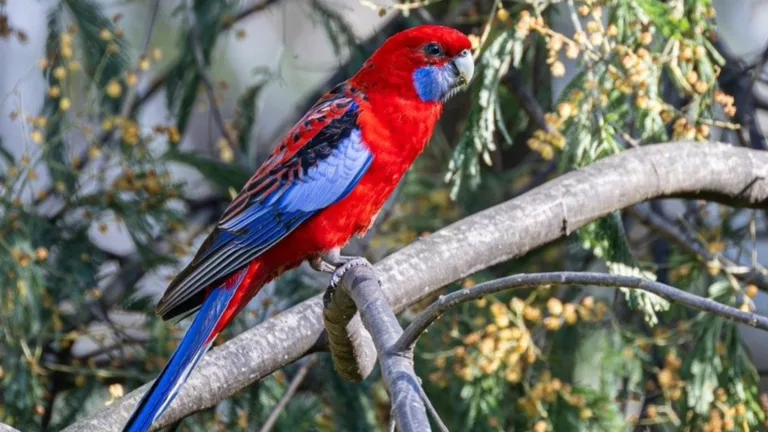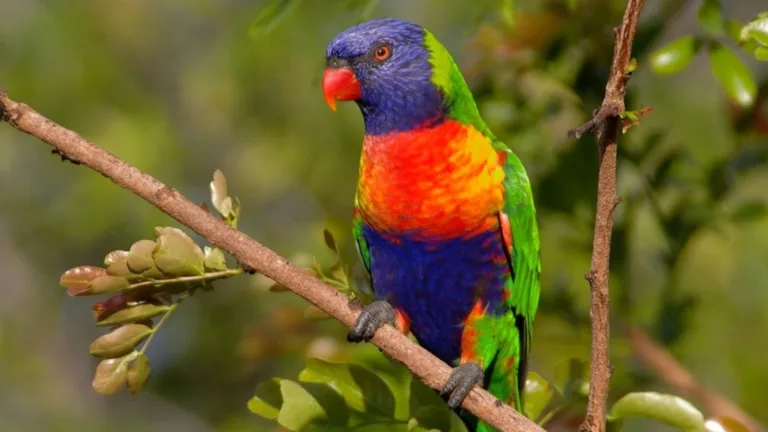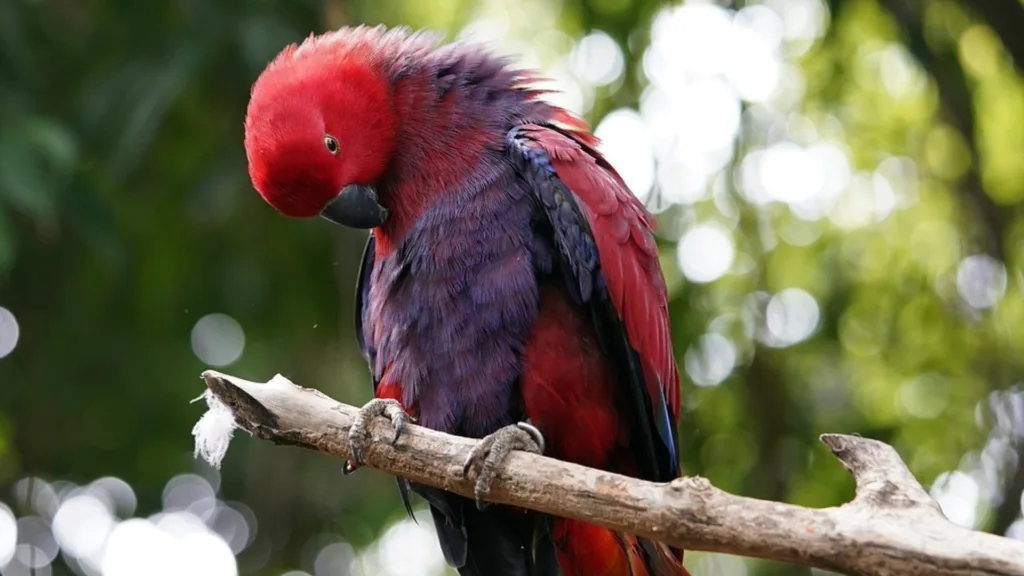four Beautiful and Amazing Companion Birds
It’s possible that
elderly people who now find themselves alone and a little bored might
benefit from the company of one of the four birds covered in this article,
Rainbow Lorikeets, Eclectus Parrots, Crimson Rosellas, and Blue-fronted Amazon
Parrots.
These birds are all quite beautiful and have vivid
colours, sharp minds, and loving dispositions.
As with other pets, birds can offer entertainment and companionship for
older Australians. Pets can help lessen
anxiety, depression and stress.
There are plenty of researched based articles
explaining how interacting with pets can reduce blood pressure and enhance
general health. The great thing about pet birds is that they are low-maintenance,
space-efficient, and can sometimes be trained to do tricks. In addition, they
don’t need to be walked every day like dogs do.
No.1 – The Hilarious Blue-Fronted Amazon Parrots
Blue-fronted Amazon Parrots are amazing birds. These amusing parrots thrive on affection and love it when you are laughing at their playful and funny antics. They will form strong bonds with you and excel at sometimes amusing speech, but their playful energy and love of noise may be better suited to a house than an apartment. Blue-fronted Amazon Parrots will not do well in too small a cage, this would affect them emotionally and mentally and I would ask that you do not do this. The Blue-Fronted Amazon is a very active parrot and requires significant space to move around their cage and stretch their wings on a regular basis.
The cage or aviary you purchase for your Blue-Fronted Amazon Parrot should have plenty of toys for them to play with, lots of space for large food and water bowls, plenty of perches and at least a few swings. As a general guideline, the minimum dimensions for a cage for your Blue-Fronted Amazon Parrot cage should be at least 150cm wide x 100cm high x 80cm deep. However, be sure to get them the biggest cage or aviary you can both afford and fit at your home.
Some Reasons to Share Your Home with a Blue-fronted Amazon.
Blue-fronted Amazon Parrots are a Charming Chatterbox. They are excellent at mimicking human speech and sounds, providing you with hours of entertainment and conversation. You could think of your Blue-fronted Amazon Parrot as a feathered comedian with wings who lives outside in a large cage or aviary!
Blue-fronted Amazon Parrots will enjoy your cuddles and kisses. Affectionate and playful, they enjoy head scratches, lots of loving snuggles, and will even give you some kisses back to show you how much they adore you.
Blue-fronted Amazon Parrots make excellent Loyal Companions, bonding deeply with their owners and lavishing them with attention and company.
Blue-fronted Amazon Parrots are Intelligent Entertainers. These inquisitive birds enjoy solving puzzles and learning new tricks, ensuring that your days are filled with laughter and surprises.
Blue-fronted Amazons are Energetic Acrobats of the Parrot world. Their playful antics and love of climbing all over you and everything in your house will keep you both entertained and active. They will keep you active as you’ll have to be often checking where they are as they sometimes think it’s funny to knock something off your table or kitchen counter. Oh Yeh, the sense of humour of a Blue-Fronted Amazon Parrot is just out of this world.
Blue-fronted Amazon Parrots have a very Long Lifespan. With proper care, these birds can live 50-60 years, becoming lifelong companions.
Blue-fronted Amazon Parrots are Incredibly Resilient and nearly always Healthy. Generally hardy birds, they are less prone to certain diseases compared to other parrots.
Blue-fronted Amazon Parrots are absolutely stunning in Appearance. Their vibrant blue plumage and bright eyes are a feast for the eyes.
Blue-fronted Amazon Parrots can actually be Relatively Quiet for a Parrot. While not the quietest parrots, their vocalizations are generally less piercing than some species.
Blue-fronted Amazon Parrots are Adaptable to Routine. They can adjust to a regular schedule, making them suitable for someone with a structured lifestyle.
Blue-fronted Amazon Parrots are Low Maintenance and don’t require a large amount of Grooming. Unlike some birds, they don’t require extensive feather trimming or preening.
Blue-fronted Amazon Parrots have very Unique Personalities. Each blue-fronted Amazon Parrot has its own quirks and charm, making them truly special companions.
Some Tips for Happy and Healthy Blue-fronted Amazon Parrots.
Blue-fronted Amazon Parrots will require a large cage or a Spacious Aviary from you. They require a large aviary with climbing opportunities, toys, and access to fresh air. Blue-fronted Amazon Parrots require daily interaction. Devote at least 3 hours per day to interaction, which should include playtime, cuddles, and training. Dietary Variety is essential for Blue-fronted Amazon Parrots. Feed your Blue-Fronted Amazon Parrot fresh fruits and vegetables, pellets, and sprouted seeds.
Blue-fronted Amazon Parrots are going to need regular exercise. Encourage climbing, foraging, and playing to keep them physically and mentally stimulated. They will love flying around your house, so obviously make sure all windows and doors are locked prior to letting them inside to do so. You might also like to have a couple of signs made up that you can hang on the outside of your entrance doors. The last thing you would want is for a friend or family member to come over and open the door and let your much loved Blue-Fronted Amazon Parrot fly away forever. Another option would be to get a couple of cheap sandwich boards made up and then position them at each entrance. A Blue-Fronted Amazon Parrot can cost anywhere between $600 to $3,200, so it is best that you take a few steps to make sure they are not accidentally let out.
Blue-fronted Amazon Parrots will need Veterinary Check-ups twice a year. Schedule 6 monthly checkups with your local avian friendly veterinarian. Blue-fronted Amazon Parrots will love sharing Quiet Times with you. Provide calm spaces for them to relax and avoid stress. Blue-fronted Amazon Parrots will love it if you sustain a Consistent Routine with them. Maintain a predictable schedule for feeding, cleaning, and interaction. Blue-fronted Amazon Parrots will need Positive Reinforcement from you. Use positive reinforcement to train them and please avoid harsh punishment speech or actions when they make a mistake or doing something that turns your smile upside down. If you upset them too much you’ll scare them and you could undo all of the wonderful relationship building stuff you’ve been doing.
Blue-fronted Amazon Parrots require Patience and Understanding. These birds are intelligent but can be stubborn. Be patient and gentle with them and they will love you for it.
Blue-fronted Amazon Parrots are a Lifelong Commitment. Remember, they are very long-term companions. Be prepared to care for your Blue-Fronted Amazon Parrot throughout their very long lives. If you do become unable to care for your Blue-Fronted Amazon Parrot one day, if it’s possible, please try to make sure there’s at least some transition time with the new owner, let your bird know that you like this person and let them become familiar with the new person before they go home with them.
Bringing Home a Blue-fronted Amazon for the first time.
Blue-fronted Amazons are wonderful companions, but they are not for everyone. They necessitate a significant amount of time, attention, and resources. Before making a decision, conduct extensive research, visit breeders or sanctuaries to meet these birds in person, and consult with your local veterinarian. Remember that a happy and healthy blue-fronted amazon parrot makes a wonderful companion. You could be opening your home to a feathered friend who will bring you laughter, joy, and companionship for decades to come if you provide them with proper care, understanding, and a spacious aviary filled with love.
No.2 – The Sweet Talking Eclectus Parrots.

Consider the Eclectus Parrot if you are looking for a great companion bird and have the financial means. They make excellent companion birds, are a reasonably quiet mimic bird, and have beautiful plumage. Consider the female Eclectus Parrot; while the males are colourful, the females steal the show with their clear speech and gentle demeanour. Remember that their territorial nature can manifest itself at times.
Here are some of the reasons why an Eclectus Parrot might be the ideal feathered companion for you.
Eclectus Parrots are Sweet Talking Companions. Female Eclectus are renowned for their clear and accurate mimicking abilities. They can learn words, phrases, and even sing simple songs, providing delightful conversation and entertainment for you.
Eclectus Parrots are very Affectionate in their Nature. These are parrots that tend to be more affectionate than any other bird you might encounter. They love being cuddled and enjoy gentle head scratches and seem to know when to tone things down at night and just enjoy some nice quiet time with their humans. This could be ideal for those that seek a very close relationship with their companion bird.
Eclectus Parrots are somewhat Quiet and very Charming. Compared to other large parrots, Eclectus tend to be quieter, with their vocalizations usually described as melodic chirps and whistles. This could be a good fit for your living situation, especially if noise restrictions are a concern. Eclectus Parrots are another Parrot with a very Long Lifespan. With proper care, Eclectus parrots can live for 50-60 years, offering you a dedicated and enduring feathered friend for decades to come.
Eclectus Parrots love Independent Playing around. While they enjoy interaction, Eclectus Parrots can actually entertain themselves quite well if you provide them with foraging toys and climbing structures, giving you some time to rest or attend to other tasks around your home and yard. Eclectus Parrots have Stunning Dimorphism. Male Eclectus are adorned with vibrant green plumage, while females boast a bold red and blue combination. This visual variety can be a conversation starter and add a touch of exotic beauty to your home.
Eclectus Parrots have a Relatively Calm Temperament. Eclectus are generally known for their gentle and easygoing personalities, making them less prone to nipping or aggression compared to some other large parrots. Eclectus Parrots are reasonably Adaptable with their Diet. They can thrive on a varied diet of fresh fruits, vegetables, pellets, and nuts, making it easier to keep your feathered friend well-nourished. Eclectus Parrots have only Moderate Exercise Needs. Compared to highly active parrots like Amazons, Eclectus require less playtime and outdoor time, which might be more manageable for you if you have the odd physical limitation.
Eclectus Parrots are Relatively Clean Birds. Eclectus have a reputation for being tidy eaters and produce less dust compared to some other parrot species, minimizing cleaning hassles for you. Eclectus Parrots are Relatively Quiet Breeders. If you so desire, Eclectus can be successfully bred in captivity. Their quieter nature during breeding season could be more manageable than the loud calls of other parrots. Not to mention the large amount of money you could potentially get for selling their kids. Eclectus Parrots are going to make you a huge hit if you offer them as a gift not everyone can afford to spend that much money on a pet.
Some Tips for Ensuring a Happy and Healthy Eclectus Parrot.
Eclectus Parrots will require a large aviary. Provide a large, multi-level aviary with plenty of climbing areas, foraging enrichment, and hiding places. Remember that exercise and mental stimulation are essential. Dietary Variety is a must for these parrots. Provide a varied diet of fresh fruits and vegetables, pellets, and nuts to meet all of their nutritional needs. A personalised diet plan should be discussed with an avian veterinarian. Socialisation on a daily basis is required. Spend time each day with your mother’s Eclectus, engaging in gentle interactions, head scratches, and quiet conversations. Remember, they want to be connected.
Vet Checkups twice a year. Schedule regular checkups with an avian veterinarian familiar with Eclectus parrots. Early detection and treatment of any health issues are crucial for longevity. Try to provide a Quiet Environment. Avoid loud noises, sudden movements that might scare them, and stressful situations. Eclectus can be sensitive to changes in their environment. Provide engaging and stimulating toys made from natural materials like wood, bamboo, and foraging puzzles. Avoid metal or plastic toys that could be harmful.
Regular Cleaning daily and weekly. Maintain a clean aviary with proper hygiene practices to prevent the spread of bacteria and maintain your Eclectus’ health. Patience and Understanding will be required form you. Remember, building trust and a bond with an Eclectus takes time and patience. Avoid harsh discipline and focus on positive reinforcement. Owning an Eclectus is a long-term responsibility. Ensure you can provide consistent care and companionship for their potentially 60-year lifespan. Research is Key to understand the needs of your Eclectus Parrot. Continue learning about Eclectus parrots, their specific needs, and potential challenges. Stay informed and adapt your care routine as your feathered friend ages.
No.3 – The Australian Crimson Rosella.

Native to the sunny shores of Australia, these vibrant birds are surprisingly good at learning words and phrases. They chirp cheerfully, play with gusto, and are relatively quieter than their larger parrot cousins, making them a good choice for someone with bird experience.
Crimson Rosellas, native to Australia, might just be the sunshine your world you have needed for a while.
Here are 12 reasons why these vibrant birds could make ideal companions.
Crimson Rosellas are chatty companions. While they are not as skilled mimics as some parrots, Rosellas can learn simple words and phrases and add cheerful chirps and whistles to brighten your day. Crimson Rosellas are playful spirits at heart. these active birds enjoy climbing, swinging, and exploring, adding a playful energy to any home. The Crimson Rosella is a relatively quiet bird. Rosellas are quieter vocalisers than larger parrots, making them ideal for apartment living or even small houses. Crimson Rosellas are breathtakingly beautiful. their vibrant red plumage with splashes of blue and yellow will transport you to a tropical paradise.
Crimson Rosellas make excellent companions. Rosellas, while not as cuddle loving as some birds, they enjoy interacting with their humans and can form strong bonds. Crimson Rosellas have a unique Native charm. Having a piece of Australian nature in your home can help you reconnect with your surroundings and bring you joy. Crimson Rosellas only require Moderate attention. Rosellas’ care requirements are manageable in comparison to some demanding parrot species, making them an excellent choice for someone with bird experience. Crimson Rosellas are tough and adaptable. These hardy birds can survive in a wide range of climates, including warmer Australian temperatures.
Crimson Rosellas have a relatively long lifespan. with proper care, Crimson Rosellas can live for up to 20 years, providing you with the possibility of long-term companionship. Crimson Rosellas require little upkeep. their food and cleaning requirements are manageable, making them a less demanding choice than some larger parrots. Rosellas enjoy interacting with other birds, so consider housing them in pairs for double the feathered fun. When it comes to allergies, Crimson Rosellas are low risk. Rosellas are less likely to cause allergies than other parrot species, making them an excellent choice for allergy sufferers.
Caring for Your Beautiful Crimson Rosella.
Here are some tips for ensuring your Crimson Rosellas live happy and healthy lives.
Crimson Rosellas will require a large cage or aviary from you. Provide a large aviary or very cage with climbing branches, swings, toys, and a sheltered sleeping area for your bird. If possible and affordable, aim for at least 6 feet by 6 feet by 6 feet. Rosellas require a large home to be happy and healthy, which may surprise you. Natural sunlight is preferred by Crimson Rosellas. Choose a location that receives plenty of natural sunlight while also providing shaded areas to escape the heat. Crimson Rosellas will need a nutritious diet. Include a variety of seeds, fruits, vegetables, and pellets in their diet, as well as daily fresh food and clean water.
Regular interaction will be beneficial to Crimson Rosellas. Spend daily time with your Rosellas, talking to them, playing with them, and gently handling them. Socialisation is essential for their well-being. Crimson Rosellas will require veterinary care twice a year. Schedule 6 monthly checkups with your local veterinarian just to be safe, especially during their first year, to ensure their health and identify any potential problems. Crimson Rosellas will require your assistance to keep their home clean. Keep the aviary clean by removing droppings and replacing food and water dishes on a regular basis. Their health is dependent on good hygiene.
Crimson Rosellas can be noisy at times. Be aware that Rosellas can be quite vocal, especially during mating season. If noise is a concern, look into soundproofing options. They aren’t always loud, but when they do make noise, they do it well. You might get a knock on the door from a neighbour who isn’t happy about the noise, but I doubt it. If noise becomes an issue, consult your veterinarian about noise control options. Crimson Rosellas will require you to keep them. Safe and healthy. Make sure the aviary is safe from predators and drafts, and avoid using harmful cleaning products or fumes near their space.
Patience and understanding are required when dealing with Crimson Rosellas. Rosellas, like any other pet, require patience and understanding. Learn to read their body language and cues, and avoid interfering if they appear stressed. Crimson Rosellas are a Lifetime Commitment. These are long-lived birds. Prepare to provide them with a loving home and dedicated care for the rest of their lives.
No.4 – The Gorgeous Rainbow Lorikeet.

The sociable and highly energetic Rainbow
Lorikeets are a happy burst of colour and song. Even though they can’t mimic as
well as other parrots can, they can still learn basic words and add a lively
touch to any home. Just keep in mind that they require lots of space to climb
and have a sweet tooth for nectar. If an
older person is looking for a happy companion bird, the Rainbow Lorikeet could
be the perfect bird companion. Rainbow
Lorikeets are another bird that I have written about in the past, so for more
information on top of what I provide in this article, please visit my Blog
Article about these amazing birds on the ‘My Pet Support’ website and here is the link.
Reasons to Have and Love a Rainbow Lorikeet.
Stunning Plumage. With their vibrant greens,
blues, and reds, these birds are living jewels, a kaleidoscope of
feathers. Playful personalities are
energetic and inquisitive, and their antics, antics, and playful interactions
will make you laugh. Sweet Serenades.
While they are not the best mimics, their adorable chirps and whistles create a
cheery soundscape in the home. They
thrive on interaction, lavishing their humans with playful affection and
cuddles.
Relatively Quiet. Their vocalisations are
generally less harsh than those of larger parrots, making them suitable for
apartments. Bonding Buddies. They form
close relationships with their humans, providing constant companionship and
emotional support. Adaptable Appetites.
Their specialised nectar diet can be fed in feeders, providing a one-of-a-kind
feeding experience. Long Lifespan. With
proper care, they can live for up to 20 years, making them a loyal (feathery!)
companion. Easy to Maintain Grooming.
Because they groom themselves on a regular basis, they require little grooming
from their humans.
Aussie Charms. These Australian-made charms add a
touch of local beauty and cheer to any home.
Natural Entertainers. Their playful acrobatics and energetic antics keep
their human companions entertained for hours.
Studies show that interacting with birds can reduce stress and improve
mood, fostering a sense of well-being.
Some Tips for Happy and Healthy Lorikeets.
Your Rainbow Lorikeet will need Large Aviary.
Provide a large, multi-level aviary with plenty of climbing and hiding
places. Your Rainbow Lorikeet will need
a Nectar rich Diet. They should eat fresh fruits and vegetables every day to
supplement their specialised nectar diet.
Your Rainbow Lorikeet will need Mental Stimulation.
Keep them mentally engaged by providing toys, foraging opportunities, and
interactive games. Daily Interaction.
Make time for daily bonding and play sessions to strengthen your bond with your
feathered friend.
Maintain a clean aviary by cleaning the cages on a
regular basis and providing fresh food and water on a daily basis. Avian Vet Care. Make an appointment with an
avian veterinarian on a regular basis for preventative care and prompt
treatment of any health issues.
Temperature Control. Avoid extreme temperatures and, if necessary,
provide shade and heating options. Be
aware of their vocalisations, especially if you live in an apartment. Allow for uninterrupted “Rainbow
Lorkikeet naps” to ensure proper rest and stress reduction. Patience and understanding. Recognise that
they can be messy eaters, and that their playful nature may occasionally result
in minor mishaps.
Keep in mind that owning a Rainbow Lorikeet is a
long-term commitment. You can ensure your Rainbow Lorikeet thrives for years to
come by providing a loving, stimulating environment and prioritising their
well-being. A Rainbow Lorikeet can be a
wonderful companion for a lonely elderly person, bringing love, laughter, and a
touch of tropical magic into their lives with careful consideration and a
commitment to their needs.
Beyond the Feathered Friend, some things you
should know.
Keep in mind that owning a bird is a long-term
commitment. You can ensure your Rainbow Lorikeet thrives for years to come by
providing a loving, stimulating environment and prioritising their
well-being. A Rainbow Lorikeet can be a
wonderful companion for a lonely elderly person, bringing love, laughter, and a
touch of tropical magic into their lives with careful consideration and a
commitment to their needs.
Visit as many pet stores, bird sanctuaries, and
breeders as you can to find the ideal match for your lifestyle and personality
and meet your prospective new feathered friend in person. With the right bird
(and a big aviary!), companionship can really take off, filling your days with
chatters, chirps, and the happy companionship of a feathered friend. Recall that birds are not decorations but
rather living creatures. Make an informed decision, prioritise their welfare,
and get ready for a lifetime of feathery and fluffy companionship.








